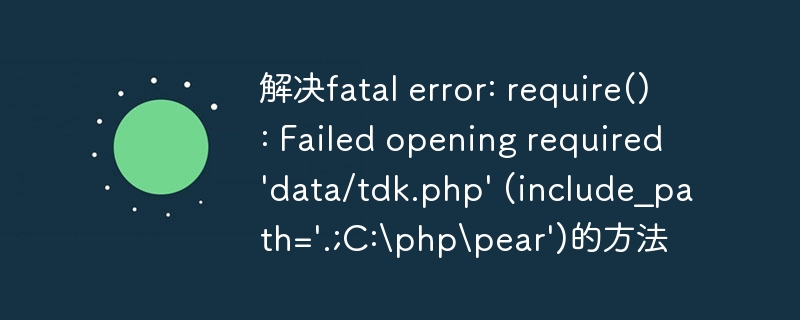

"Methods to solve fatal error: require(): Failed opening required 'data/tdk.php' (include_path='.;C:phppear')"
Recently, some PHP developers have encountered a troublesome problem during the development process: when they use the require() function in PHP code to load a required file, the following error will appear:
fatal error: require(): Failed opening required 'data/tdk.php' (include_path='.;C:phppear')
This The error is usually caused by the value of include_path. The function of include_path is to specify the path under which the PHP program looks for the required files.
There are several ways to solve this problem:
The simplest solution is to use the full path to load the required document. For example, data/tdk.php in the above error, if we know which directory it is in the server, we can use the full path to replace it. For example:
require('/var/www/html/project/data/tdk.php');In this way, the PHP program can directly find the required file and load it correctly.
But this method has a disadvantage, that is, when we need to test or run the program on different servers, because of the different paths, we need to modify the paths all the time, which is very troublesome.
Another method is to modify the value of include_path in the PHP configuration file php.ini. Open the php.ini file, find the include_path item in it, and separate multiple paths with semicolons, for example:
include_path = ".:/usr/lib/php:/usr/local/lib/php:/path/to/your/files"
In this way, the PHP program will search for the required files in these paths in turn. If we are in the /data directory, we can add it to include_path:
include_path = ".:/usr/lib/php:/usr/local/lib/php:/path/to/your/files:/data"
After modifying the php.ini file, restart the PHP service and the required files can be loaded normally.
PHP provides the __DIR__ constant, which represents the directory where the current script is located. (Use dirname(__FILE__) before PHP5.3.0) We can use it to solve the above problem, that is, use relative paths in the code. For example:
require(__DIR__ . '/data/tdk.php');
In this way, no matter which path we copy the entire program to, the PHP program can correctly use the required files.
Summary:
You can choose one of the above three methods to solve this problem according to the actual situation. If it is a personal development project, you can use the third method. If you are developing collaboratively with multiple people, or running programs on different servers, it is recommended to use the second method. If you don't want to modify the PHP configuration file, but you don't want to use the full path to load the file every time, you can use the first method.
No matter which method is used, attention should be paid to the case of the file path and the correctness of the file name. These may cause this error. By choosing the correct method, you can load the required files correctly and allow the program to run properly.
The above is the detailed content of Methods to solve fatal error: require(): Failed opening required 'data/tdk.php' (include_path='.;C:\php\pear'). For more information, please follow other related articles on the PHP Chinese website!




